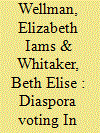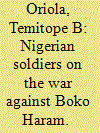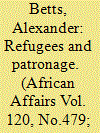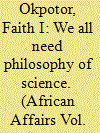|
|
|
Sort Order |
|
|
|
Items / Page
|
|
|
|
|
|
|
| Srl | Item |
| 1 |
ID:
178094


|
|
|
|
|
| Summary/Abstract |
In 2010, Kenya extended voting rights to its estimated 3,000,000 citizens living abroad, thus joining a growing number of countries in Africa and around the world to recognize emigrant voting rights. Yet despite a politically engaged diaspora, intensive government outreach to emigrants, and high-stakes electoral competition, fewer than 3,000 Kenyans were permitted to vote from abroad in the 2013 and 2017 presidential elections. What explains the failure of the Kenyan government to implement diaspora voting on a broader scale? Drawing on original interviews and archival documents, this article analyses the tumultuous battle over the adoption and implementation of external voting in Kenya, focusing especially on legal, logistical, and political challenges. We argue that uncertainty about the number of Kenyan emigrants and their political preferences, paired with a highly competitive electoral climate, meant there was little political will to push for more widespread implementation of diaspora voting. Our analysis of external voting in Kenya has implications for diaspora participation in other competitive electoral contexts across the continent and beyond.
|
|
|
|
|
|
|
|
|
|
|
|
|
|
|
|
| 2 |
ID:
178095


|
|
|
|
|
| Summary/Abstract |
Expanded homeownership in Johannesburg’s townships offered the prospect of post-apartheid formal inclusion. Yet allocation of title to former rental homes has been characterized by a profound lack of normative consensus regarding ownership or inheritance. In bitter disputes over houses, appeals to law jostle and interweave with claims in a customary register. In much regional scholarship, normative pluralism provides a point of departure for understanding disagreement of this kind. This article proposes an alternative perspective by examining how dissensus is mediated and given shape by a legal–administrative process. Law becomes inchoate in layers of bureaucratic encounter, while contested claims to custom are sharpened at the interface with bureaucracy. In South Africa, taking administration as a starting point reveals the long shadows of apartheid in concrete experiences of the law, in extra-legal understandings, and in the very terms of contestation among kin. Illuminating the little-explored topic of urban property inheritance, the perspective has broader implications for understanding inequality. Inclusion through homeownership is a form of ‘adverse incorporation’ marked by official opacity, diffidence regarding the law, stratifying administrative dualism, and uncertainty about the parameters of ownership and inheritance.
|
|
|
|
|
|
|
|
|
|
|
|
|
|
|
|
| 3 |
ID:
178092


|
|
|
|
|
| Summary/Abstract |
This study explores two main questions: What are the experiences of soldiers who have fought against Boko Haram? What can these experiences teach us about the seeming incapacity of the Nigerian military to defeat Boko Haram? Six major themes are explored. These are perspectives on the mission, morale of troops, military equipment and weapons, suicide and murder–suicide among troops, intelligence leaks, and relationships of troops with the Civilian Joint Task Force, an extralegal militia. Soldiers’ discourses on the mission against Boko Haram reveal three overlapping dimensions. First, there are suspicions about the sponsors and political godfathers of Boko Haram. This suggests a belief that Boko Haram is a conspiracy involving the government and top brass of the military. Second, the patronage system involved in deployment into key positions on the war front. Third, participants believe that the war is being deliberately prolonged because it is a moneymaking machinery for the political and military elites. The evidence suggests that availability of weapons varies by unit and the agency of commanders—their networks and influence within the military and willingness to disobey orders from superiors if their demands are not met. This situation produces radically variegated wartime experiences among troops. Non-commissioned soldiers believe senior commissioned officers perpetrate intelligence leaks and are responsible for the protracted war. Senior Army Generals interviewed in this study support this perspective. The study has major policy implications for successful operations against Boko Haram in the Lake Chad Basin area and the broader war against terrorism in the Sahel.
|
|
|
|
|
|
|
|
|
|
|
|
|
|
|
|
| 4 |
ID:
178093


|
|
|
|
|
| Summary/Abstract |
Institutional explanations of intra-party violence rarely address political economy dynamics shaping the institutions in question, and therefore they fail to understand their emergence and their stability. Specifically, focusing on institutional factors alone does not enable a nuanced understanding of candidate nomination violence and why some constituencies are peaceful while others are violent. This article theorizes nomination violence in dominant-party systems in sub-Saharan Africa. Drawing on political settlement theory, it examines the nature of nomination violence in Uganda’s October 2015 National Resistance Movement (NRM) primaries. We argue that the violence is a constitutive part of Uganda’s political settlement under the NRM. Nomination procedures remain weak in order for the NRM ruling elite to include multiple factions that compete for access while being able to intervene in the election process when needed. This means, in turn, that violence tends to become particularly prominent in constituencies characterized by proxy wars, where competition between local candidates is reinforced by a conflict among central-level elites in the president’s inner circle. We call for the proxy war thesis to be tested in case studies of other dominant parties’ nomination processes.
|
|
|
|
|
|
|
|
|
|
|
|
|
|
|
|
| 5 |
ID:
178096


|
|
|
|
|
| Summary/Abstract |
Uganda’s self-reliance policy for refugees has been recognized as among the most progressive refugee policies in the world. In contrast to many refugee-hosting countries, it allows refugees the right to work and freedom of movement. It has been widely praised as a model for other countries to emulate. However, there has been little research on the politics that underlie Uganda’s approach. Why has Uganda maintained these policies despite hosting more refugees than any country in Africa? Based on archival research and elite interviews, this article provides a political history of Uganda’s self-reliance policies from independence to the present. It unveils significant continuity in both the policies and the underlying politics. Refugee policy has been used by Ugandan leaders to strengthen patronage and assert political authority within strategically important refugee-hosting hinterlands. International donors have abetted domestic illiberalism in order to sustain a liberal internationalist success story. The politics of patronage and refugee policy have worked hand-in-hand. Patronage has, in the Ugandan case, been integral to the functioning of the international refugee system. Rather than being an inevitably ‘African’ phenomenon or the unavoidable legacy of colonialism, patronage politics has been enabled by, and essential to, liberal internationalism.
|
|
|
|
|
|
|
|
|
|
|
|
|
|
|
|
| 6 |
ID:
178097


|
|
|
|
|
| Summary/Abstract |
Explaining and Understanding are considered mutually exclusive in political research. In this view, Explaining involves making observations as an outsider, with emphasis on causal laws, generalizations, and predictions. Conversely, Understanding occurs from the inside, with emphasis on meaning-making. This research note addresses Explaining, Understanding, and the related concept of reflexivity in multi-method/mixed-method research involving fieldwork. Rather than taking for granted the dichotomy between Explaining and Understanding that stems from Cartesian anxiety, I argue for the non-mutually exclusive alternative of ‘explanatory understanding’ and propose analyticism as the appropriate methodological path. An analyticist methodology involves creating a model that is a general account of a phenomenon, which is then used in case-specific analytical narratives to reveal departures from the model. Since understanding requires adequate explanation, explanatory understanding helps us better make sense of the world. Therefore, Explaining and Understanding are not merely oppositional stances between identifying causes and making sense. We cannot identify causes without making sense, and making sense involves a degree of causal inference. Explanatory understanding also necessitates reflexivity, which I conceptualize as methodological and personal positionality. I apply these arguments to my study of post-election violence in West Africa, drawing on fieldwork experience in Ghana, Nigeria, and Côte d’Ivoire.
|
|
|
|
|
|
|
|
|
|
|
|
|
|
|
|
|
|
|
|
|